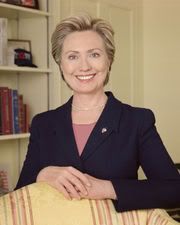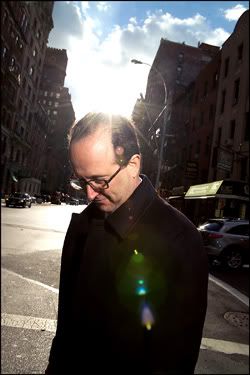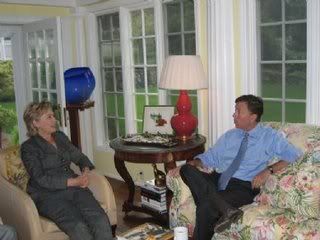(cross-posted at Deny My Freedom and Daily Kos)

I’m going to preface this entry by saying that I live in New York, so I feel I have some right to speak as a constituent of Senator Hillary Clinton (D-NY). In addition, the reason why the title of this entry is Why I would vote for Hillary Clinton is simply this: I attend college in Pennsylvania, and I feel that my vote in the 2006 midterm elections will be much more valuable to Pennsylvania’s Senate Democratic nominee, Bob Casey, then it will be for Clinton, who is going to easily cruise past her primary challenger, Jonathan Tasini, as well as her eventual Republican opponent in the general election.
Many in the blogosphere do not like Hillary Clinton. It’s a strange shift from the hearty support that the former First Lady drew during the 1990s, when many on the left applauded her for being more than your typical president’s wife. To me, the sources of this anger are largely twofold: first, many are upset with Clinton’s position on Iraq, particularly that she refuses to recant her 2002 vote to authorize Bush to use military force against Iraq. The tone of her reasoning certainly won’t win her any love from many of us – including myself:
Still, Mrs. Clinton has not backed away from her initial vote, a stand that has helped her avoid the sort of flip-flopping charges leveled by Republicans at Senator John Kerry during his 2004 presidential campaign, even as it has complicated her effort to distance herself from criticism that she was a war supporter.
“You know, you don’t get do-overs in life or in politics,” she said in an interview in late June. “You have to be a grown-up. I take my lumps.”
Of course you don’t get do-overs, but there’s nothing wrong with admitting mistakes – something the current occupant of the White House has been loath to do. But what that excerpt brings out is the second reason why many on the left do not like Hillary: they see her as someone who has slowly shifted to the right in preparation for a presidential run in 2008. Whether it be her hawkishness on matters of national security or a perceived rightward shift on abortion, many feel that she has abandoned her liberal roots in order to appeal to centrists around the country. Anytime Clinton is questioned about a potential presidential run, her campaign always sidesteps the question and states that she is focused on her re-election this year. When you see Time run a massive story on the possibility of Clinton ’08, though, it almost seems like it’s inevitable that she will run, much to the chagrin of progressives and liberals in the grassroots and the netroots.
I am no fan of Hillary Clinton. She is a card-carrying member of the Democratic Leadership Council (DLC), an organization that I revile for their hostile, dismissive attitude towards the netroots. Her hawkishness disturbs many of us who believe that the current conflicts in the world must be solved through diplomatic, not military, means. But if I were voting in New York this year, I would be pulling the lever for her on Septemer 12, even if I am more in line with Jonathan Tasini’s views – and below are my reasons why.
Who is Jonathan Tasini?

I consider myself to be fairly informed about politics. However, I didn’t have a clue about Jonathan Tasini’s background until I went to the Wikipedia entry on him. His own campaign website doesn’t have a biography of what he does. So for those of you who may be in the dark about him, here’s a bit about Tasini:
Jonathan Tasini (born 1956) in Houston, Texas, is the current president of the Economic Future Group, a national consulting group in the United States. He is a strategist, organizer, activist, commentator and writer, primarily focusing his energies on the topics of work, labor and the economy. He writes most frequently for the popular labor and economy blog Working Life. He is currently challenging incumbent Senator Hillary Rodham Clinton in the Democratic primary.
From 1990 to April 2003, he served as president of the National Writers Union (UAW Local 1981). Tasini’s term as NWU president was quite controversial and divisive; some members blame him for failing to act properly when members began to notice problems with the union’s health insurance program. Ultimately, the insurance company was unmasked as a fraudulent operation and went under, leaving members with unpaid bills and no coverage.
Some members stood by Tasini, who remains the union’s president emeritus, while others bitterly criticized his leadership skills. The union began suffering a severe dip in membership during the later years of his term and has not recovered.
Tasini was the lead plaintiff in the case of New York Times Co. v. Tasini, in which the U.S. Supreme Court ruled (in June 2001) in favor of the copyright claims of writers whose work was republished in electronic databases. He is also the president and executive director of the Creators Federation.
This little bit draws into question just how competent Tasini is. It appears that under his watch, the union that he led suffered a great deal from declining membership and from being linked to a fraudulent insurance company. There doesn’t appear to be much love from members of the NWU:
With the reputation of the Tasini-Menaker regime having tarnished the NWU throughout the writing world, how badly will this hinder the NWU’s organizing efforts–efforts that President-elect Colby has promised to make a priority? The arrogance and power-hunger of the outgoing regime (one can hardly term it `leadership’) has crippled the NWU, something it can ill afford as it struggles to gain members and revive itself as a primary and indispensable bulwark against the global corporate onslaught. How will the new organizing VPs encourage writers to reassert their role in the struggle? How will we undo the damage? What’s in all this to attract new members to the cause of writers in particular and labor in general?
Taking a look at Tasini’s stances on the issues, there is much that the grassroots would support: immediate withdrawal of the troops from Iraq, impeachment of both Bush and Dick Cheney, pro-gay marriage, and anti-death penalty. The positions he takes appeals to liberals like myself who would be more inclined to vote in a primary election. But while his positions on national issues are excellent, how good is his grip on local issues in New York? Being a senator is a position of national prominence, but it is replete with local politics. Clinton has worked hard to ditch the notion that she is a carpetbagger, connecting with and surprising people in New York, particularly residents in the more conservative upstate region. Her issues page highlights what she has done for the New York. An excerpt from the Time article shows how she familiarized herself with the military presence in the state:
This year the Republicans couldn’t even find a credible candidate to take her on, in no small part because of the inroads she has made in more conservative upstate New York. There are other unlikely places where she has won friends and admirers. When Hillary was first elected, General John Keane, then Vice Chief of Staff of the Army, sought an audience, hoping to acquaint the new Senator with some of the Army’s priorities in her state, including West Point and the perpetually deployed 10th Mountain Division, based at Fort Drum. It didn’t entirely surprise him that it took three months to get on her schedule or that, once he did, her staff called his twice to remind him that she couldn’t spare more than 15 minutes.
When he finally got in to see her, however, the meeting did not go as he had expected. For starters, it lasted 45 minutes. “She committed immediately to West Point and the 10th Mountain Division, with follow-up on-site visits,” he says. “But it was her enormous depth of knowledge about the military and her sincerity about our people which surprised and disarmed me.” As First Lady, Hillary told Keane, she had traveled the globe and had often been able to see parts of the world that security prevented her husband from visiting but where the U.S. Army was always present. “She had an extraordinary grasp of our military culture, our soldiers, our families and what it was like for them,” Keane marvels.
Another favorable personal recounting comes from The New Republic:
But, if her relationship to Elmira at the start of her campaign was tenuous at best, since then the town has become emblematic of just how intimately Clinton has gotten to know the geography, politics, and personalities of upstate New York–and how well upstate New York has gotten to know her.
Sitting in a living room adorned with pictures of Clinton posing with various members of his family, Elmira City Council member and former Mayor Jim Hare ticks off all the local places she has been: Bradley Farms, the Hilliard Corporation, Granny’s Restaurant, the warplane museum, Brand Park, Elmira City Hall, Light’s Bake Shop, Mandell’s Restaurant. “She shakes hands with people, and they come away very impressed,” says Hare, a moderate Democrat. “She’s not the demon they thought she was.”
Recently, the New York Times did a profile of Tasini. He hardly comes off as someone who can easily work the crowds and pick up supporters:
Tramping across picnic blankets before the outdoor movie in Bryant Park on Monday night — “Take off your shoes,” people yelled — Mr. Tasini drew skeptical glares as he bellowed: “New York Democrats? Any Democrats here?”
Here and there he was invited to make his pitch: that Senator Clinton “supports criminalizing flag-burning,” “supports discrimination against gay couples on marriage,” and “supports the Yankees even though I’m the lifelong Yankees fan.” He was clearly grateful for any attention.
Out of 20 voters who talked to Mr. Tasini, about half said in interviews afterward that they would consider voting for him. Among those were a group of young female voters, a demographic that the Clinton camp views as part of its core support.
The same Times article begins with a reference to Ned Lamont and his victorious surge to the Senate Democratic nomination in Connecticut. Lamont was able to gain popularity among the grassroots because he went to town committee meetings, really got to know the local issues well, and had an outstanding background – a successful small business executive who has volunteered his time as an after-school public school teacher. Jonathan Tasini’s most notable accomplishment appears to have been driving a national union into the ground.
Hillary Clinton is a team player

It may surprise you to know that Hillary was once president of a College Republicans chapter. However, as long as she has been a Democrat, she has been a staunch supporter of the Democratic Party. Her move towards the center has led to some improbable alliances, such as those with former House speaker Newt Gingrich on the issue of health care. But she has never used her position as a Democratic senator to lash into the Democratic Party. And although she may be shifting her position on Iraq more slowly than other prominent Democrats, such as Senator John Kerry or former senator John Edwards, it is clear that she is recognizing that the war is becoming worse the longer we stay there, or that the political winds are shifting, or both. She voted for the Levin/Reed resolution that stated the Bush administration needed to formulate an exit strategy. More recently, Clinton has called for Donald Rumsfeld’s resignation – a move that comes better late than never. Some gripe over Hillary’s corporate ties, but she supports net neutrality, even though an official from her husband’s administration, Mike McCurry, does not – and says so in an extremely hostile manner. And if one looks at Clinton’s Progressive Punch scorecard, she does surprisingly well – she is ranked 10th overall. That’s higher than either Russ Feingold or John Kerry.
I do not have exact figures for the amount of money that Hillary has given to other Democrats, but it’s sure to be a decent amount, given her prodigious fundraising skills. On her political action committee’s website, she is raising money for all kinds of Democrats – whether they be for shoo-ins such as Dianne Feinstein, incumbents in a tight race such as Daniel Akaka, challengers such as OH-Sen Democratic candidate Sherrod Brown, longshots such as TX-Sen Democratic candidate Barbara Ann Radnofsky, and netroots favorites such as NY-29 Democratic candidate Eric Massa.
Joe Lieberman got in trouble in Connecticut not solely because of his position on Iraq. It’s for writing editorials that blast those in his party and for being an egoist of the highest order. Although Hillary endorsed Lieberman during the primary, afterwards, she endorsed Lamont, donated $5,000 from HILLPAC, and more recently, offered to raise more money along with lending Lamont one of her senior advisors, Howard Wolfson, for the duration of the campaign. This is what being a good Democrat is about; even though they may differ on Iraq, they are nearly identical on all other issues. Lieberman, on the other hand, is throwing the Democratic House challengers under the bus now that they support Lamont.
One also questions just how good of a Democrat Jonathan Tasini is. He hailed Lamont’s victory as a sign that his campaign would gain traction, but shortly thereafter, he criticized Lamont:
“I, frankly, differ with Ned Lamont,” he told WNYC’s Brian Lehrer. “You know let’s be honest, Ned Lamont is not a progressive Democrat. Ned Lamont’s position on war has shifted a number of times…. Ned Lamont’s position on the war did shift and I don’t see his position as being the same as mine.”
It seems rather disingenuous to criticize the person one hopes to follow to an insurgent victory in a Democratic primary. The general feeling one gets from Tasini is that he knows he has no chance at getting any sort of real support in the primary. He has no money and no real support from the grassroots. All that he is getting from this is free publicity, perhaps to rehabilitate his public image after his unceremonious departure from the NWU.
Conclusion
As I said above, I’m probably more aligned with Jonathan Tasini on the issues than Hillary Clinton has been. But as a Democrat, I would not be able to, in good faith, vote for someone who doesn’t present himself as genuine political candidate or as a good representative of the Democratic Party. Hillary is a very good Democrat. Do I want to see her be president? No; I think we need someone who is less hawkish in charge of repairing our diplomatic relations with the world after the Bush administration leaves town in 2009. But as a senator from New York, she gets my full support.




